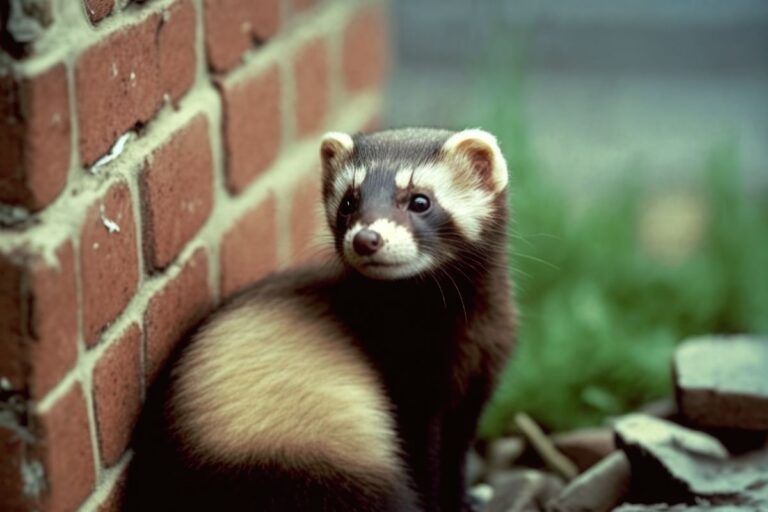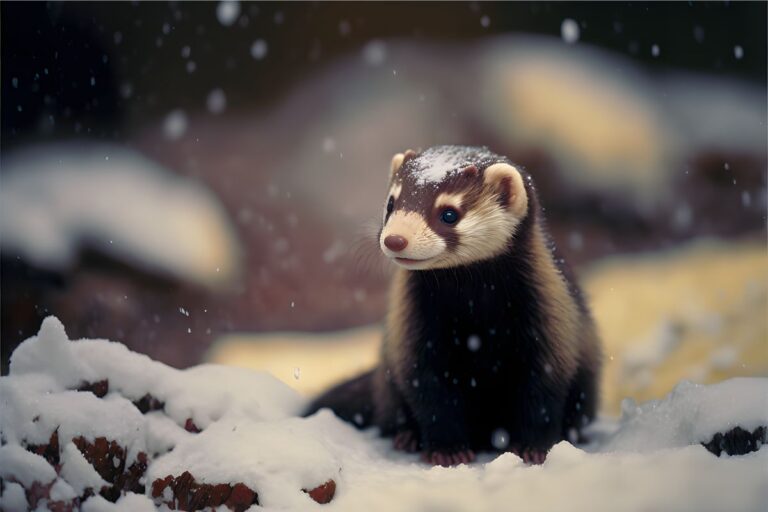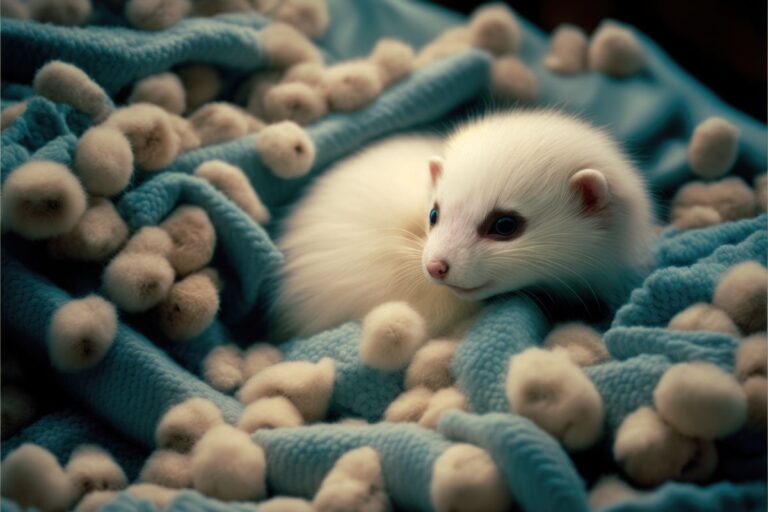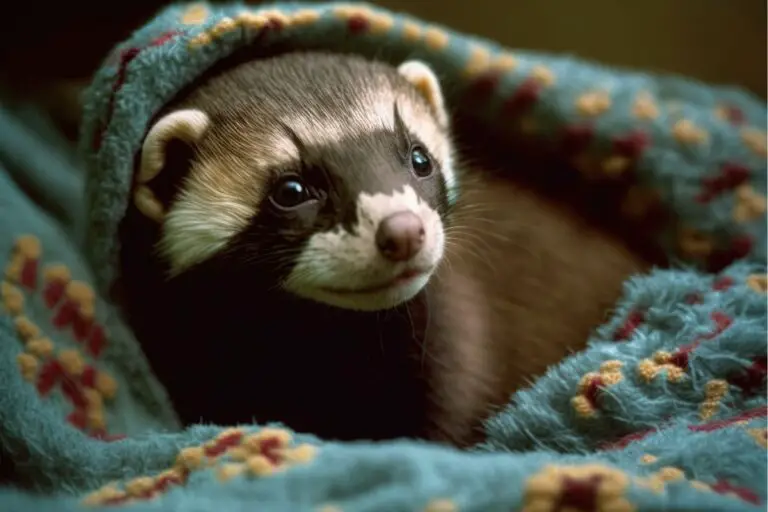Do Ferrets Hibernate? A Helpful and Useful Guide
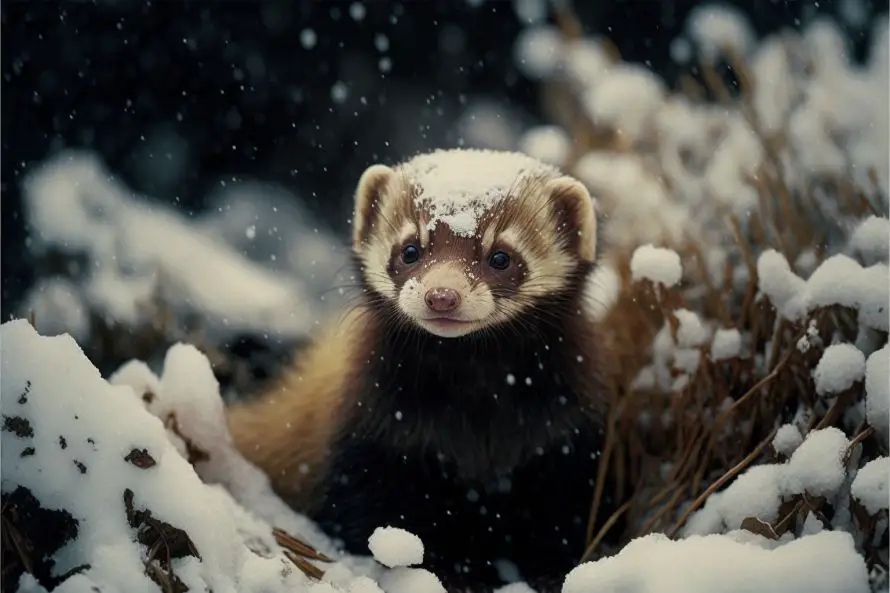
Do ferrets hibernate? No, they don’t. Despite that fact, however, they experience a series of behavioral and physical changes during winter. We’ll take a look at what hibernation is and we’ll examine wintertime changes ferrets go through, including sleeping cycles and the “dead sleep” phenomenon.
Do Ferrets Hibernate? Everything You Need to Know About Ferrets’ Sleeping Patterns
Ferrets make for great pets as they are loving, curious, and quite active. But come wintertime, they often start acting really weird. They suddenly become capable of sleeping throughout the day — not to mention that this energy level decrease results in a weight gain. Suddenly, our beloved pets look a lot chubbier than before and they seemingly lose all interest in socializing. Occasionally, this change of attitude is so drastic, it makes us think — do ferrets hibernate?
What Is Hibernation?
Hibernation is a way for many animals to survive the cold, dark winters, and the lack of food the extreme weather brings along. It includes physiological changes such as a drop in body temperature and an overall metabolic slow-down in order to conserve energy.
A hibernating creature is not exactly sleeping, but it’s not awake either. Depending on the species, hibernation might involve complete physical inactivity or deep unconsciousness for a very long time. Thus, hibernators can go without eating, drinking, urinating, and defecating for quite a while.
Small mammals such as hamsters, hedgehogs, and dormice are well-known hibernators, but there are several species that make rather unexpected hibernators.
The common poorwill, for example, is the only hibernating bird — it usually hides under a pile of rocks to survive the cold. The Antarctic Cod, on the other hand, is a fish known to enter a dormant state to preserve energy. The only primate that enters a form of hibernation is the dwarf flat-tailed lemur from Madagascar. In order to survive the dry season, it feeds on the fat from its tail.
Although we might think otherwise, ferrets are not on the list of expected hibernators. So do ferrets hibernate at all?
Regular Ferret Sleeping Habits
Ferrets generally sleep a lot, so their lengthy winter sleeping hours shouldn’t really worry us. Still, the species is capable of sleeping up to 18 hours a day, so it’s no surprise we sometimes ask ourselves, Do ferrets hibernate?
They don’t, of course, but sometimes it sure seems like they do. To understand our furry critters better, let’s take a look at their regular sleeping patterns.
Kits Sleeping Habits
A baby ferret or a kit sleeps a lot more than ferrets of any other age. They can easily sleep up to 22 hours a day. Just like human babies, they only wake up to eat and go potty.
Young ferrets that are up to a year old, on the other hand, sleep less than babies. But they still snooze for approximately 20 hours a day. Still, they are the most inquisitive and the easiest to excite and therefore to wake.
In fact, it’s not unusual for older kits to refuse to fall asleep, because there’s just too much going on around them. In this case, owners need to take them to a quiet, comfortable, dark place and help them fall asleep.
Adult Ferret Sleeping Habits
A day in an adult ferret’s life consists mostly of… you guessed it — sleeping. A healthy adult ferret can sleep more than 18 hours a day, depending on their age, activity levels, and gender. Elderly ferrets tend to sleep more than adults. Furthermore, males are generally lazier than females and they spend more time sleeping. Often, males need to be prompted to eat and drink.
Ferret owners know that their pets don’t sleep for 18+ straight hours. They sleep for any number of hours (usually more than 5) and they wake to feed, play, and explore. These critters are usually active at least 4 hours a day, but the exact schedule can differ.
Where do ferrets sleep?
The most accurate answer is — anywhere. A tired ferret can fall asleep just about anywhere. We’ll find them snoozing in a blanket or a hammock, napping in a drawer or a wardrobe. If your ferret seems to be missing for a few hours, look under the couch, in the mattress, in the laundry pile, or just about every dark corner of the house.
These furry creatures instinctively search for hidden, dark places to sleep in no matter how strange those might seem to us, humans. They are burrowing animals, so even when they sleep in a cage, it’s important to set it up so they have plenty of hammocks to snuggle in and hide.
Moreover, ferrets need to sleep in the dark as too much light will interfere with their sleep cycle. So the cage should be placed in a dark, quiet corner of a room. If there’s not much you can do about the light reaching the cage, make a fabric cover for it to make sure our babies are comfortable and safe.
The Ferrets’ Dead Sleep Phenomenon
Ferrets occasionally do this thing called “ the dead sleep” that makes their owners wonder, Do ferrets hibernate? In reality, though, our ferrets sometimes sleep so soundly and deeply that they seem dead and cause us to shiver.
We can pick them up, pet them, pinch their ears, shake them and they still just hang limply from our hands like a rag doll. Before we start to panic, we should check their breathing and heartbeat. If the heartbeat is slow and steady, the ferret’s body is warm and the nuzzle is moist, there’s nothing to worry about — they are just deep sleeping.
Some fuzzies do this regularly and owners are used to the sight, while others do it occasionally and scare the life out of their humans. When “dead sleep” happens, leave the ferret alone as they are likely to open their sleepy eyes soon and start bouncing around like new.
The Dilemma — Do Ferrets Hibernate?
Regardless of where they live, ferrets don’t hibernate. Despite that fact, as already mentioned, they tend to become less active during cold, winter months and spend more time sleeping. Equally hyperactive, both pet and wild ferrets turn sluggish and lazy during the frosty, winter days and nights.
Wild Ferrets
In wintertime, wild black-footed ferrets spend around 90% of their time in prairie dog burrows. Not only do prairie dogs make up nearly all of the ferrets’ diet, but their burrows serve as shelters, offering protection from predators and harsh weather. Also, these underground dens serve as a pantry, because ferrets hunt for more than they need and store the surplus for later.
In winter, ferrets usually leave their dens only during the first few hours of a day, to investigate and scan for potential threats. Even males, who otherwise cover great distances in search of mates and prairie dog colonies, stay underground for a week at a time. Their level of activity decreases as well as the distances they cover in order to conserve as much energy as possible.
Pet Ferrets
Most ferret owners know just how much time their pets can spend sleeping. Although these critters are considered to be nocturnal animals, they easily adjust their sleeping habits to their human schedule. They sleep up to 18 hours a day and can wake up to play or eat whenever they are active.
However, in the winter months, even before the first snowfall, our pets enter the winter sleeping mode. So let’s discuss that for a moment, shall we?
The “Winter Mode”
As most owners know, ferrets are likely to start slowing down as early as late October, but they always pick up the pace again in spring. Our furry friends are simply preparing for the upcoming winter. Although the answer to the question do ferrets hibernate is negative, we’ll take a closer look at a series of changes they go through each winter.
1. The Winter Coat
Depending on the season, ferrets are capable of undergoing a complete makeover. Changes in the thickness and appearance of their coat can be quite drastic, but we often don’t even notice them until we see a photo of our ferret from before the transformation.
Generally speaking, ferrets go through two coat changes per year. During summer, their coat is short, silky, and darker in color. Also, they may lose the mask or just be left with eye patches during the warm season. In the fall they develop a longer, fluffier coat and often grow a full-face mask. The winter outfit is lighter in color due to the thick, pale undercoat.
Weight Gain
Our ferrets will not only look puffier but they are likely to get quite chubby. Weight gain usually goes hand in hand with the coat change and it’s a natural process. Our fuzzies are putting on enough blubber to get them through the harsh winter and they are likely to lose it all by spring.
Preparing for the colder days, however, they bulk up and can sometimes end up weighing up to 40% more in wintertime than in summer. Weight gain can start as early as late October, but it entirely depends on the temperature and light levels they are exposed to.
Inactivity
Most of the time, once our pets grow the winter coat and puff up, they suddenly get the urge to snuggle. Even though ferrets do not hibernate, their energy levels drop significantly. Oftentimes, the weight gain contributes to the sluggishness as much as the cold. It’s hard for a ferret to move around with the extra weight on.
Another factor leading to inactivity might be the thick, long winter coat ferrets develop. Combined with a heated home, the dense fur simply attributes to laziness and inertness. Simply, they might be too hot.
The truth is, ferrets sleep longer in the winter, whatever the reason might be.
So, Do Ferrets Hibernate?
The answer is no, they don’t. Sleeping consumes the biggest chunk of a ferret’s day, but they still have active and awake periods during the day. In the fall, ferrets develop a lush, heavy coat and some extra blubber preparing them for the upcoming winter. Most of these critters will become less active in this period and sleep a lot more than usual.
Although they might fall into a “dead sleep,” posing the actual Do ferrets hibernate? question is unnecessary. Every owner knows that their furry friend will be up and running before long, being as silly and charming as ever.

